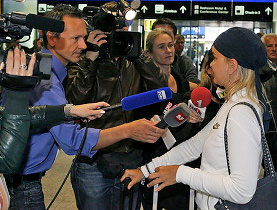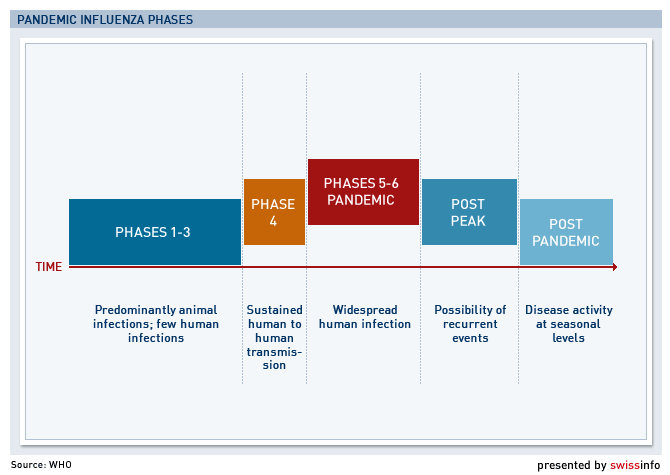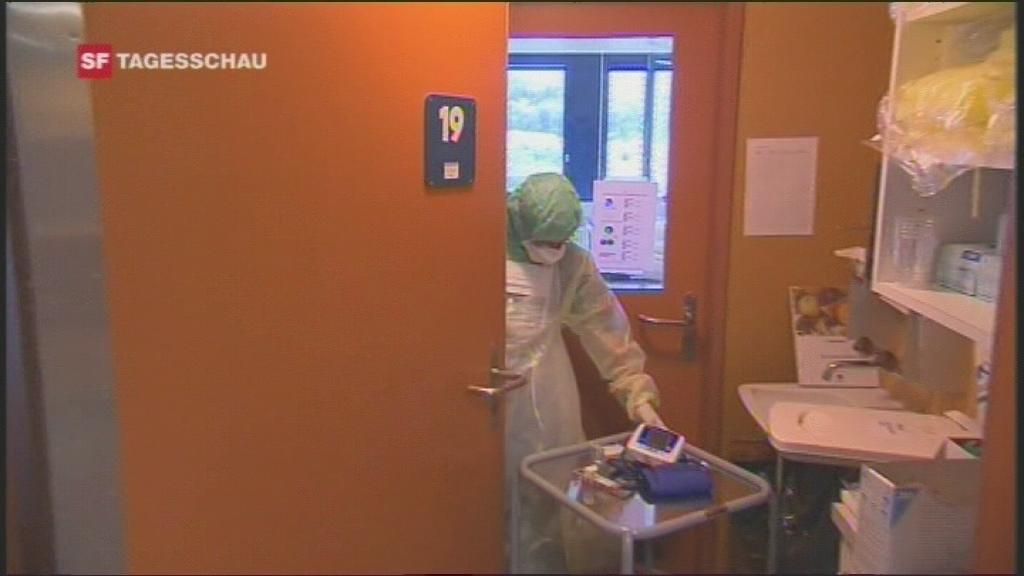Switzerland readies for more swine flu cases

The Federal Health Office says no new measures are needed for the time being against the deadly swine flu virus, despite a first case being confirmed in Switzerland.
Thomas Zeltner, the health office director, told a news conference in Bern on Thursday that the country was following World Health Organization guidelines for pandemic alarm level five.
There are 29 suspected cases of swine flu in Switzerland in the cantons of Geneva, Vaud, Valais, Bern, Zurich, Basel Country and St Gallen. They all concern people who have returned from Mexico.
The confirmed case is a young man who earlier this week also returned from Mexico and is now in a cantonal hospital in Baden, near Zurich.
“He’s fine and recovering. He had a mild form of swine flu,” Zeltner said.
The 19-year-old is being treated with Tamiflu, the oral antiviral drug produced by Swiss pharmaceutical group Roche.
Incorrect diagnosis
The man’s condition was incorrectly diagnosed initially and he was released from hospital. However, a later test proved positive and he was readmitted.
A senior consultant at the hospital, Jürg Beer, explained that after a first negative result, another sample had arrived at the national influenza centre in Geneva. This second test proved positive.
“The patient is very well, but we understand that he’s angry,” he commented. Beer added that communication had to be improved.
Zeltner denied that Switzerland was downplaying the swine flu situation.
“We have no reason to minimise the situation. But it is not dramatic,” he said.
Zeltner also noted that the virus was less aggressive in Switzerland at the moment than a regular seasonal flu virus.
But he explained that there might be more confirmed cases in the country. “We have to ensure that the virus does not spread on a pandemic level.”
Precautionary measure
In a related development, an aircraft carrying 300 passengers from Cancún in Mexico arrived in Zurich on Thursday morning. As a precautionary measure they were asked to fill in a form with their details.
“The good news is that nobody on the plane from Cancún felt ill or is ill,” Zeltner said. “We’re handing out information and considering setting up medical checks.”
Organisers of the current ice hockey world championship in Bern and Kloten, near Zurich say they are following the situation but have not taken any particular measures.
Pharmacies in Switzerland have been warning people to be responsible when buying Tamiflu.
Only on prescription
The Swiss Association of Pharmacists, pharmaSuisse, said the drug should only be sold with a doctor’s prescription because of possible risks.
Some media reports in Switzerland have spoken of people buying Tamiflu over the counter, while others were stockpiling it. Demand since Saturday had “exploded”, according to Zurich’s Tages-Anzeiger newspaper, a claim considered exaggerated by pharmaSuisse.
“We can’t see a real explosion. There has been a certain amount of demand, but the main demand we’ve seen in the pharmacies is for information,” the organisation’s head of communication, Marcel Wyler, told swissinfo on Wednesday.
Wyler at pharmaSuisse said his organisation was advising people to ask pharmacists and doctors what they really needed as “Tamiflu has to be carefully used because of the risks of resistant viruses”.
He quashed media reports that Tamiflu was in short supply in Switzerland.
Tamiflu available
“It’s possible that with the increase [in sales] over the past few days, stocks haven’t been filled as fast as necessary but we have confirmation from the industry that Tamiflu is available,” he said.
The Swiss Agency for Therapeutic Products, swissmedic, warned people on Thursday not to buy Tamiflu from the internet. It said this could put people’s lives in serious danger because there was no guarantee that the drugs received would be the correct flu treatment.
In another development, European Union health ministers met later on Thursday and agreed to impose no travel restrictions to and from Mexico. The leaders also said, if need be, they would pool their stores of antiviral drugs and share them among the member states.
The WHO has said it believes a pandemic is very likely and called on all governments to activate their emergency plans.
It is not advising restrictions on regular travel or closure of borders.
swissinfo with agencies
This swine flu variation, termed H1N1, is an influenza A virus spread from person to person.
It contains DNA from avian, swine and human viruses. Although swine flu viruses normally infect only pigs, they do sometimes cross the species barrier to cause disease in humans, according to the WHO.
It is passed from human to human by sneezing, coughing or by hand contact. The WHO says swine flu is not transmitted to people eating properly handled and prepared pork or other products derived from pigs.
New flu strains can spread fast because no one has natural immunity and a vaccine can take months to develop.
A telephone hotline has received hundreds of calls for information since it went into operation on Monday.
It is being run by the Medgate Telemedicine Center on behalf of the Federal Health Office.
“The main questions are: Can I travel to the United States or Mexico? Are there any restrictions? They are also asking whether they should take any medication or prevention measures if they have to go,” Cédric Berset, the head of marketing and communication at Medgate explained.
The telephone hotline number is 031 322 21 00 (inside Switzerland) +41 31 322 21 00 (outside the country).


In compliance with the JTI standards
More: SWI swissinfo.ch certified by the Journalism Trust Initiative




You can find an overview of ongoing debates with our journalists here. Please join us!
If you want to start a conversation about a topic raised in this article or want to report factual errors, email us at english@swissinfo.ch.